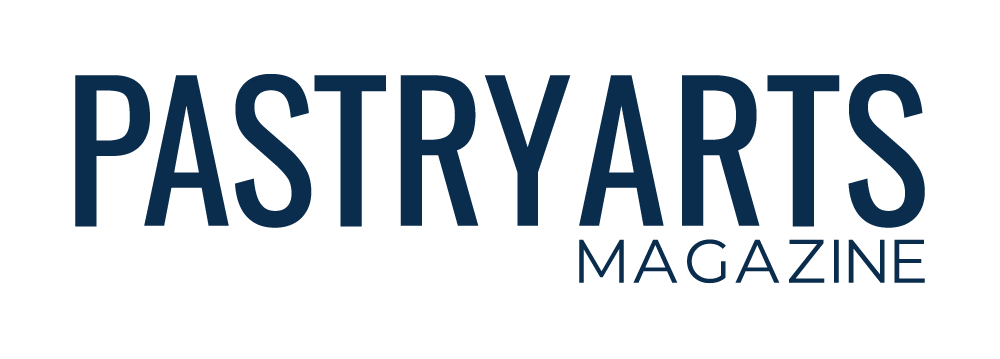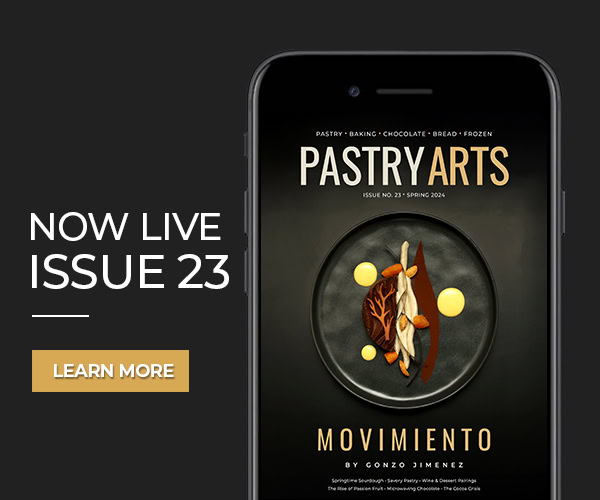(This article appeared in the Summer 2020 issue of Pastry Arts Magazine)
Claire Heitzler is an accomplished French pastry chef, cookbook author and consultant who believes in responsible, respectful and seasonal pastries. She honed her skills working in some of the most prestigious kitchens around the world and has been awarded numerous best pastry chef titles, including by Le Chef Magazine in 2012 and by Relais Desserts Association in 2014. After a recent stint as the creative director at La Maison Ladurée in Paris, Heitzler struck out on her own in 2018 to form a consulting business to focus on sharing her passion for ethical pastry with others.
Well-sourced ingredients have been part of Heitzler’s ethos from the very early stages of her career. One of her first positions in the industry was working for Michel Troisgros at his three-star Michelin restaurant in France, where each day, the fruits and vegetables were delivered straight from the farms to the kitchens. And as she transitioned to working for Alain Ducasse in Japan, that same mentality followed. “We were always searching for new products and new ingredients to bring to the table,” Heitzler explains, and so meeting the producers, farmers and growers was an important aspect of her work. “I wanted to get to know them and to be in touch with them, but that’s not very common,” she notes of pastry kitchens. While many chefs have shifted their focus to sourcing ethically and understanding where products come from, it is still somewhat of a novelty in pastry.
Realizing this knowledge gap was one of the reasons Heitzler began her consulting business and how she found her way to partner with Valrhona. In 2018, she accompanied the chocolate producers on a trip to visit the M. Libânio cocoa plantation in Brazil to understand their commitment to high quality products with 100% traceability to the source. In 2019, Heitzler began a collaboration with L’École Valrhona to bring that same spirit of ethical sourcing to other ingredients, beyond the chocolate. Bringing other chefs directly to citrus and berry growers, for instance, educated them about seasonality and sustainability. “If we want to make sure that these small producers stay with us and stay alive doing their craft in ten years, it’s today that we really have to be active,” she states. These visits also provided them with a chance to understand the nuances in products and to stimulate their imaginations when they went back into their kitchens. So much exploration and creativity resulted from these visits, that Heitzler and Valrhona collaborated on a book called Reflective Pastry Chef’s Guide to Ethical Pastry-Making.
At a recent event held at L’École Valrhona in Brooklyn, New York, Heitzler answered some questions about her pastry philosophy while she presented some of her recent creations inspired by her visit to a nearby greenmarket.
Since the beginning of your career, have you seen climate change affect the ingredients that you use?
Yes, definitely. For example, the first rhubarb just came this week [mid-March]. Five or six years ago, we easily would have waited many more weeks.
A lot of people see sustainability as a restaurant trend, rather than an industry movement. How do you convince people in the industry that sustainability is really important?
I think that the soil is really crying out for help, and it’s the land that is asking us to do this today. I think that we, the professionals, can really help. I’m really convinced about that, giving our clients seasonal fruits and vegetables. Like for example, a strawberry that we’re eating in the winter absolutely does not have the same taste as a strawberry we’re eating in the summertime, and our clients know that. So, if we have the habit of always eating really great strawberries that are found in the middle of the summer, we won’t want to go back to eating strawberries that are grown in the middle of winter.
You mentioned that a lot of the chefs that you worked for helped inspire you by using seasonal ingredients. Who would you say is your biggest inspiration for the way you create?
Alain Ducasse really helped me to grow at this level. He really fights for the naturalness of fruits and vegetables. He really challenges his team of chefs. When I was working for him, I couldn’t present him a pastry or a dessert without knowing exactly from where each ingredient came. You really had to know, without any guessing.
Because you’ve always learned this way, do you think you had an “a-ha!” moment where you wanted to focus on ethical sourcing?
I think I’ve always been like this, but the older I get, the more it grows on me, this way of being.
And so, what advice would you give to someone that’s just starting out in the industry who wants to become an amazing pastry chef?
To be curious before anything and to taste everything. We’ve become very technical; we weigh everything, we mix everything, and we use everything. Sometimes we forget just to taste it and to make everything evolve naturally. I think also with social media today, everything has to be beautiful. Everything has to be colorful. For me, what’s most important is what’s in the spoon. That it tastes good.
Do you feel the pressures of social media and new trends happening so fast?
I admit I don’t have pressure from social media. I really feel it’s important to be oneself and to assume what we believe in.
And are you hopeful about the future?
Today the consumer has to be reassured and to know what he’s getting to eat, so it’s good. It’s been a long time since we’ve asked ourselves so many questions about our raw materials.
Photos courtesy of Valrhona









You must be logged in to post a comment.